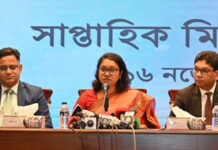Nation pays homage to Liberation War heroes on 41st anniversary of victory
Celebrating the 41st anniversary of victory in the Liberation War, people from all strata yesterday called for immediate completion of war crimes trial.
They also vowed to resist the fundamentalist and militant forces to establish a secular and prosperous Bangladesh.
The nation is bearing the stigma of war crimes since its birth in 1971. Initiative has been taken to try the war criminals, and the country is now waiting for the end of the trial to get rid of the burden of stigma.
“The last wish of my life is to see the execution of death sentences to war criminals. If the wish is fulfilled, my soul will rest in peace after my death,” said Jahangir Alam, a freedom fighter.
Alam was observing the Victory Day celebration programme at the Dhaka University playground yesterday.
This was the wish not only of Alam, rather it appeared that the same were the wishes of thousands of people, who called for hastening the war crimes trial and upholding the spirit of independence.
“Like that of 1971, the whole nation will have to remain united against communalism, fundamentalism and militancy–this should be our victory day pledge,” said Kajal Abdullah, a student of Dhaka University.
The nation yesterday celebrated the day saluting the valiant sons and daughters of the soil, who made their supreme sacrifices for the birth of Bangladesh.
On this day in 1971, Pakistani occupation forces chief general AAK Niazi along with 93,000 troops surrendered to the joint forces of Mukti Bahini and Mitra Bahini in Dhaka.
Bangladesh proclaimed its independence on March 26, 1971 after 23 years of struggle for self-determination, bringing down the erstwhile West Pakistani armed forces’ genocidal wrath on its people the night before.
In a heinous genocide, the Pakistan army and their local collaborators — Razakars, Al-Badrs and Al-Shams — launched a barbarous crackdown on the innocent people of Bangladesh at midnight past March 25, 1971.
The nation, under the paramount leadership of Bangabandhu Sheikh Mujibur Rahman, finally clinched independence on December 16 after the nine-month war.
Prime Minister Sheikh Hasina placed wreaths at the National Mausoleum in Savar on the outskirts of the capital at dawn.
Leader of the Opposition Khaleda Zia, different political, social and cultural organisations, senior government officials also gathered at the mausoleum to pay tribute to the martyrs.
Enthusiastic with the spirit of independence, people of all walks across the country rushed to the memorial of the martyrs to pay tributes to the war heroes.
Hasina also placed a wreath at the portrait of the Father of the Nation Bangabandhu Sheikh Mujibur Rahman at Bangabandhu Bhaban in the city’s Dhanmondi before attending the Victory Day parade at 10:30am.
Later, Hasina took salute from the armed forces at the parade programme at the National Parade Square. President Zillur Rahman could not attend the programme due to illness.
The day was a public holiday. The national flag was hoisted atop all government, semi-government and other important establishments. The day was heralded by a 31-gun salute at dawn.
Bangladesh missions abroad also celebrated the day. Special prayers were offered in the mosques, temples and churches across the country.
Parts of the capital wore a festive look on the day. Many buildings were illuminated, while vehicle owners also sported the flag on their automobiles.
Streets had been swarmed with enthusiastic people carrying banners of different political, social, cultural and professional organisations, and singing patriotic songs.
Many were seen draped in green and red clothes matched to the national flag.
After placing wreaths at the National Mausoleum in Savar, LGRD Minister and Awami League General Secretary Syed Ashraful Islam said they hoped to end the war crimes trial and implement some verdicts before the next Victory Day.
To mark the day, newspapers published special supplements, television channels broadcast talk shows, cultural programmes and dramas.
Different political, social and cultural organisations organised elaborate programmes including discussions, rally, procession, photo exhibition, painting competition.
Source: The Daily Star










